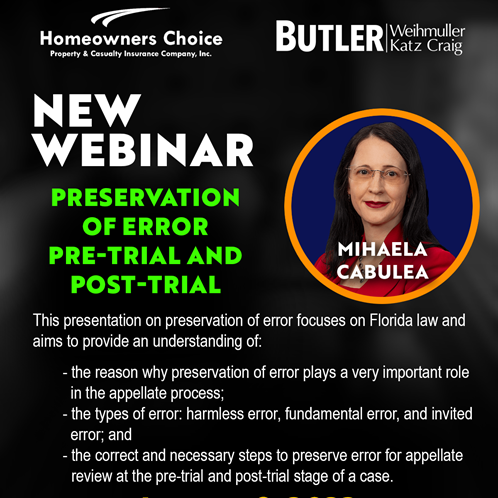
September 28, 2015
A Florida appellate court recently held that the breach of a protective safeguard condition did not automatically suspend coverage. Depositors Insurance Co. v. CC&C of Lake Mary, LLC, 40 Fla. L. Weekly D1716 (Fla. Dist. Ct. App. July 24, 2015). While the policy specified that the insurance would be automatically suspended upon a breach of the protective safeguard condition, the appellate court held that a showing of prejudice was required to support a denial of coverage.
CC&C of Lake Mary, LLC, purchased a business owner’s policy from Depositors Insurance Company. The policy contained a Protective Safeguard Endorsement where the policyholder agreed to maintain a central burglar alarm in consideration for a significant premium reduction. The endorsement stated that “[t]his [i]nsurance will be automatically suspended at the premises” if the policyholder failed to maintain a burglar alarm system monitored by a security company or failed to notify the insurer of any suspension or impairment of the system.
The policyholder entered into an alarm monitoring contract but eventually failed to pay the amount due on that contract. After the alarm monitoring company canceled that contract for non-payment, the policyholder did not notify the insurer of the cancellation. About three weeks after the cancellation, the policyholder’s property was burglarized. The parties agreed that the burglary would not have been detected even if the alarm monitoring contract had been active. The insurer denied the theft claim based on the policyholder’s breach of the protective safeguard endorsement.
The policyholder sued the insurer, alleging breach of contract. The parties filed cross-motions for summary judgment as to whether the policyholder’s breach of the protective safeguard condition barred recovery of insurance benefits. The parties agreed that the protective safeguard condition was a condition precedent under the policy. The trial court found that the insurer had not been prejudiced by the breach of the protective safeguard condition based solely on the fact that the burglary would not have been detected even if the alarm monitoring contract had been in effect. For this reason, the trial court entered final summary judgment for the policyholder.
The insurer appealed, and the appellate court reversed for two reasons. The first reason was that the appellate court held that the protective safeguard condition was a condition subsequent under Florida law. So a showing of prejudice was required to support a denial of coverage—despite the express language of the policy stating that the insurance would be automatically suspended upon a breach of the protective safeguard condition. Arguably, this express language has been effectively removed from Florida policies unless the facts before the court establish that the insurer has been prejudiced by the breach.
The second reason was that the appellate court held that the trial court erred when it focused its prejudice analysis on whether the burglary would have been detected if the alarm monitoring contract had been in effect. The appellate court explained that, in a case involving a protective safeguard condition, the issue of prejudice depends on whether the insurer had an opportunity to decide whether to cancel the policy, increase the premium, or waive the policy condition. The appellate court remanded the case back to the trial court for further proceedings consistent with this ruling.
The CC&C ruling is significant because it is the first appellate decision by a Florida state court to analyze a breach of a protective safeguard condition. This ruling is also significant because it holds that a protective safeguard condition is a condition subsequent under Florida law. By contrast, the majority rule around the country is that protective safeguard conditions are conditions precedent to coverage. This means that prejudice to the insurer is not presumed in Florida courts when a policyholder has breached a protective safeguard condition.
Because the CC&C opinion is the first appellate decision analyzing the breach of a protective safeguard condition, CC&C may be the overture for further litigation on this issue. This decision by the Fifth District Court of Appeal does not bind the other appellate courts in Florida, which may agree with the majority view that protective safeguards conditions are conditions precedent to coverage (which would trigger a presumption of prejudice to the insurer under Florida law). But for the time being, CC&C remains the only Florida appellate decision on this issue.



